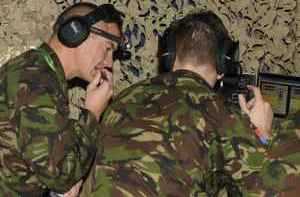
A new Afghanistan database at the Air Battlespace Training Centre (ABTC) in RAF Waddington is providing ground troops and pilots with a realistic simulator in order to prepare for their upcoming Afghan deployment.
The Distributed Synthetic Air Land Training (DSALT) facility enables pilots to fly simulated missions in support of soldiers who are engaged with computer generated enemy forces on the ground.
Training Staff taking part in Exercise Mountain Dragon have said that the facilities provide the best synthetic training available anywhere in the world for the Army and RAF to practice their fighting skills.
The Air Battlespace Training Centre (ABTC) at RAF Waddington in Lincolnshire recently reopened following a major refurbishment and software upgrade offering scenarios that are more realistic than ever before.
The ABTC synthetic environment allows individuals and teams to train in a high-threat environment and carry out the Tactics Techniques and Procedures that cannot be practiced in normal peacetime training.
The exercises are supported by a technical and operational team comprised of military, ex-military and civilian backgrounds.
The military personnel that have been using the simulator include RAF Tornado aircrew from II (AC) Squadron based at RAF Marham in Norfolk, Army Air Corps personnel from Wattisham Airfield in Suffolk and soldiers from 97 Battery, 4th Regiment based at Topcliffe in Yorkshire. They are all due to deploy to Afghanistan next year.
It is the first time that most of the soldiers have taken part in this type of integrated air-land synthetic simulator training.
RAF Waddington's Officer Commanding, Wing Commander Mike 'Elvis' Costello said:
"We can't replace the need for live training altogether but we can get as close to actual operations through synthetic simulated training.
"How good it is depends on how immersed the players get in it and they are finding it as close to the real thing as you can get without the 'knee-tremblers' you experience under fire.
"Exercises like Mountain Dragon provide targeted training for soldiers on the ground in Afghanistan operating very close to the enemy on how to work with the RAF's fast jets, and attack helicopter pilots, how to talk to them, and how to effectively execute a mission."
Among the first military personnel to try out the system, as part of Exercise Mountain Dragon, are troops who act as Fire Support Teams (FSTs) including Forward Air Controllers (FACs) on the front line.
The job of the FST is to co-ordinate modern weapons; from the Army's artillery, mortars and Apache helicopters to the bombs and missiles used by the RAF's fast jets, to engage the enemy without endangering their own comrades, allied forces or civilians.
Royal Artillery Gunnery Training Team Chief Instructor Lieutenant Colonel Stuart Gray has been involved in training all the Army Brigades deployed on Operation HERRICK and was in Helmand province during Operation PANTHER's CLAW. His team provide the Army training staff for Exercise Mountain Dragon.
He said:
"The Air Battlespace Training Centre, and specifically Exercise Mountain Dragon, provide the best synthetic training opportunity for the Army and RAF to practice their fighting skills currently available anywhere in the world.
"The course at RAF Waddington is awesome and has a significant impact on both soldiers and airmen and their ability to coordinate and deliver military firepower.
"This is truly joint training at its best and is definitely improving operational effectiveness and saving lives in Afghanistan."
The ABTC contains simulators for the Typhoon, the Tornado GR4 bomber, AWACs early warning aircraft, and the AH-64 Apache helicopter.
Its simulators can also represent the effects of Harrier GR9 aircraft, A-10 'Tankbusters', F16 fighters, C-130 Hercules Transport aircraft, attack helicopters and support helicopters.
These all operate within a common synthetic environment within which the ABTC can create computer generated forces from almost every nation in the world to act as allies, neutrals and adversaries.
A key element of the training is the debrief where the centre's software allows users to view the exercise: in a two dimensional view from above the battle space, in a three dimensional representation of the complete battle space from any position in it (including from the cockpits), to a 'through the eyes' viewpoint of the soldier on the ground calling in artillery and air support.
The ABTC is not limited to the four walls of a hangar at RAF Waddington. Its technicians have used secure long-haul networks to link up with simulators operated by the Army Air Corps, Royal Navy, United States Air Force, Australian Air Force and the Canadian Air Force.
U.K. MoD
02.11.2009